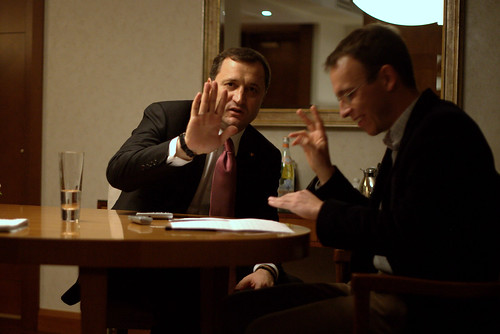Moldova: An unravelling success story?
By Sean L Hanley, on 5 June 2013

Photo: Anna Woźniak via Flikr CC BY-SA 2.0
Vlad Filat, until recently Liberal Democrat Prime Minister of Moldova, is locked in a power struggle with Vladimir Plahotniuc, the country’s one and only oligarch. This war of attrition threatens the Eastern Partnership’s ‘success story’ and with it Moldova’s reform project says Andrew Wilson.
Not every policy detail may have been perfect in Moldova since 2009, but at least the narrative seemed right. Eastern Europe’s only ruling Communist Party fell from government. The changeover was mythologised as the ‘Twitter Revolution’ – a precursor of the ‘Arab Spring’ and ‘Moscow Winter’ – although in fact it was a prosaic process of elections and parliamentary arithmetic. The Communists were replaced by the smooth-sounding Alliance for European Integration, which was soon getting rave reviews for its reform efforts from the EU. Tiny Moldova leapfrogged the other five states in the Eastern Partnership and seemed to be first in the queue to sign an Association and Deep and Comprehensive Free Trade Agreement at the Vilnius summit in November 2013.
By 2013, however, reviews were getting more mixed. Since the beginning of the year, Moldova has plunged into the kind of political infighting reminiscent of Orange Ukraine at its worst. After a previous crisis over the presidency was solved in 2012, it had seemed the current parliament would sit out a full term until the next elections are due in 2014. Today, Moldova has to sort out three simultaneous problems: it has no stable government, new elections are threatened and it is limping toward the November summit. It might collapse over the finishing line or just before; it might have a sudden burst of energy in the finishing strait; or it might fail a last-minute dope test.
So what went wrong? In reality, the three-party Alliance for European Integration was badly designed at birth; more exactly, at its rebirth. The first incarnation of the AEI in 2009-2010 struggled with a minimal majority over the Communists. That majority was improved at new elections in November 2010, but the elections also gave Russia the chance to push hard for an alternative alliance between the Communists and the pivotal Democratic Party (which includes many ex-Communists). Vladimir Putin sent his right-hand man, Sergei Naryshkin, to Chisinau to seal the deal. He didn’t succeed but encouraged the Democrats to secure a high price for not defecting back to the Communists, with the signing of a secret agreement in December 2010, leaked in 2012, to partition not just ministries but also supposedly neutral state institutions and revenue streams among the AEI’s three component parties. (more…)
 Close
Close

